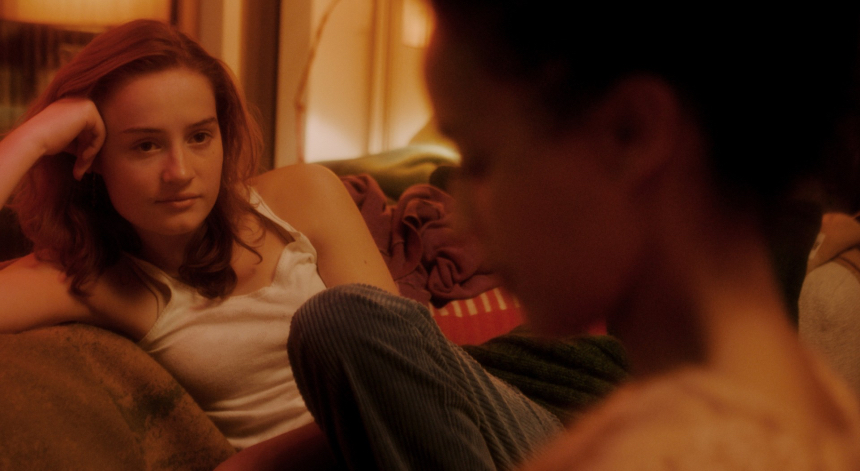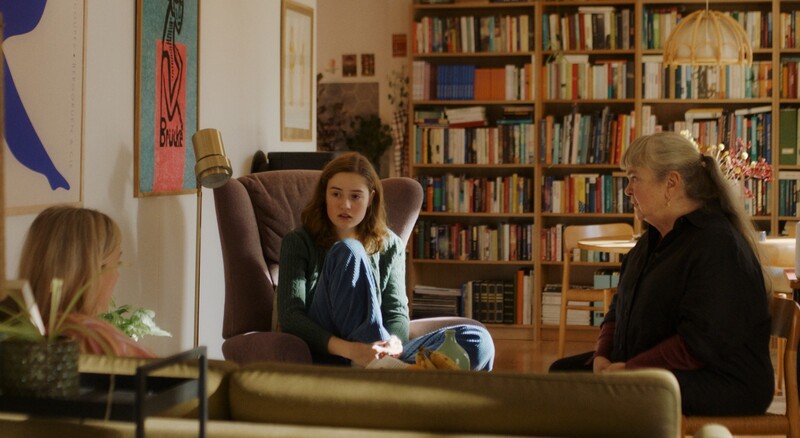Berlinale 2025 Review: DREAMS (SEX LOVE), Shapeshifting Coming-of-Age Examines Desire Across Three Generations
Dag Johan Haugerud examines the fluid boundaries between love, desire, and memory in a film where language shapes both personal discovery and intergenerational reflection.

Norwegian filmmaker Dag Johan Haugerud’s latest film, Dreams (Sex Love), takes place in a domestic setting where three generations of women confront their personal histories of love and desire.
At the center is 17-year-old Johanne (Ella Øverbye), who develops an intense infatuation with her teacher Johanne (Selome Emnetu). The film’s early scenes follow her as she struggles to understand her emotions while seeking opportunities to spend time with her teacher outside the classroom.
One of her primary means of processing these feelings is an extended monologue, where she attempts to articulate what is unfamiliar to her. Haugerud emphasizes the rhythm of her words, allowing language to take precedence over imagery, as the film depicts her at home and in brief encounters with her teacher.
Johanne documents her first experience of love in writing, producing an extensive pseudo-memoir of nearly 200 pages. Intended as a way to preserve the memory, the text remains private until, in a moment of impulse, she shares it with her grandmother, Karin (Anne Marit Jacobsen), a published author.
Her grandmother reacts differently than expected. Rather than being unsettled by the raw and unfiltered nature of Johanne’s account, she sees literary promise in it. However, when she passes the manuscript to Johanne’s mother, Kristin (Ane Dahl Torp), against her granddaughter’s wishes, the response is far less measured.
Kristin is outraged, suspecting the teacher of misconduct, particularly given the manuscript’s detailed descriptions of the teacher’s body. While the mother focuses on potential impropriety, the grandmother remains more interested in the text’s artistic qualities.
Although mother and grandmother initially focus on different aspects of Johanne’s writing, they gradually find common ground. Her text sparks an unexpected conversation about their own past experiences, expanding the film’s scope beyond a personal coming-of-age story into a reflection on love and desire across three generations.
Dreams (Sex Love) serves as the concluding chapter in Haugerud’s Sex-Love-Dreams trilogy, continuing his exploration of human relationships and the ways personal experience is shaped by societal expectations. A novelist as well as a filmmaker, Haugerud has long examined how language, spoken, written, and left unsaid, mediates human interaction.
His previous films, I Belong and Beware of Children, centered on moral dilemmas and the contradictions of everyday life. These works, structured around conversations that expose shifting power dynamics, relied on long takes. With Dreams (Sex Love), Haugerud extends this approach, emphasizing monologues and dialogues in which language dominates the visual composition.
As the final installment of the trilogy, Dreams (Sex Love) brings together the thematic threads of its predecessors. Sex explored the performative and transactional nature of sexuality, while Love examined the divide between romantic ideals and lived experience. Here, Haugerud shifts focus to the way memories of love, shaped by time and reinterpretation, influence personal identity.
Johanne’s writings become more than a record of first love; they serve as a lens through which her mother and grandmother confront their own pasts. Her words do not merely capture adolescent emotion but reveal the unspoken regrets, desires, and contradictions that persist across generations.
Dreams (Sex Love) explores the tension between youthful idealism and adult pragmatism. Johanne’s emotions are raw and consuming, yet she gradually encounters the boundaries between fantasy and reality. Her mother and grandmother, drawn into their own reflections, reassess their pasts through her experience.
The grandmother, in particular, recalls her hippie years and her own take on love where physical desire intertwines with spiritual transcendence. Her perspective blends primal instincts, not limited to lust, with a search for something beyond the physical, resulting in a mix of irreverence and sincerity.
What begins as a Scandinavian coming-of-age story, more direct and introspective than its American counterparts, resists the familiar tropes of hormone-driven adolescent turmoil. Unlike the wave of Euro female-centered coming-of-age films from the past decade, Dreams (Sex Love) shifts focus when Johanne’s manuscript sparks a debate between the older generations. This exchange pushes the film beyond a conventional coming-of-age arc toward a more layered exploration of desire, memory, and personal reinvention.
Haugerud’s background as a novelist is embedded in Dreams (Sex Love), where literature becomes both a theme and a structural device. Johanne’s opening monologue, delivered in an unbroken stream of thought, is dense and rhythmic to the point that even reading the subtitles can feel overwhelming.The style recalls mumblecore but with a more polished production. However, once the focus shifts to the mother and grandmother analyzing Johanne’s manuscript, the film takes on a meta-fictional quality.
Charmed by her daughter´s text, Kristin soon abandons the idea that her daughter was coerced and instead interprets the text as a “queer awakening,” while Karin admires its lyricism, noting that the imagery and the style exceed Johanne’s years.
The film’s literary nature may divide audiences. The steady flow of dialogue, with fewer visual interludes, might be challenging for some with shorter attention spans, yet the exchanges between mother and grandmother reach an unexpected comic peak. Meanwhile, Johanne watches in frustration as they dissect her writing, missing what, to her, was its primary purpose: preserving the intensity of first love.
Whether Johanne fully surrenders to the desire that overwhelms her remains one of the film’s main tensions, as Haugerud carefully navigates the boundary between fantasy and reality. While the story carries a melancholic undercurrent befitting its teenage protagonist, Dreams (Sex Love) unfolds as a warm, novelistic, shape-shifting intergenerational dramedy.
Dreams (Sex Love) won the Golden Bear for Best Film at the Berlinale 2025.
Dr�mmer
Director(s)
- Dag Johan Haugerud
Writer(s)
- Dag Johan Haugerud
Cast
- Ane Dahl Torp
- Selome Emnetu
- Ingrid Giæver










